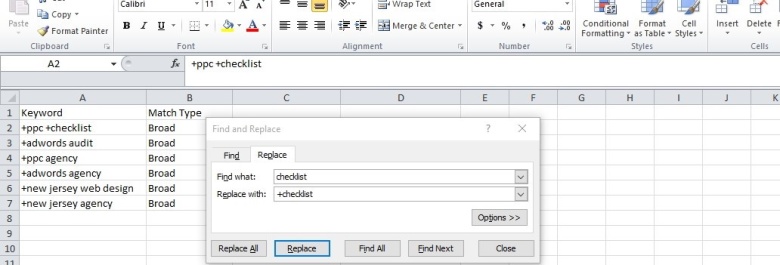When we start using Google Ads for the first time, we’re all a little guilty when it comes to overusing broad match. Yes, broad match does get a bit of a bad rap though with some negative keyword discipline it can be a great way to bring in a lot of traffic. In fact, we recommend that you start out with broad match so that you can seed as much quality search query data as possible. But there’s also a smarter way to go about broad match if you know that the “relevant variations” of traditional broad match just isn’t going to do it for you.
The disciplined broad match that helps your account evolve
There are two immediate action items to keep in mind when working with broad match:
Know when certain synonyms or variations just aren’t going to work
For example, if you are selling chocolate vegan ice cream, but you only sell vegan products, you already know that “relevant variations” just aren’t going to work – any search query that isn’t for a vegan food just isn’t going to cut it.
In that sense, you’ll want to add a “+” sign to your broad match term. This marks a broad match modifier. This “+” protects your keyword from generating ads for any queries that are anti-vegan.
Extracting valuable search queries from broad match
We get into negative keywords in another post of the PPC Audit Checklist, but the steps for performing this next method are pretty similar. When using broad match, the idea is that you want to split your account structure into ALPHA and BETA campaigns.
The BETA campaigns collect the data using broad match modified keywords, while the ALPHA campaigns are targeting the very specific and juicy long tail keywords that you’ve extracted from your broad match data. Being able to extract data from your search terms is a very important aspect of the evolution of your account.
Without broad match, though, you’ll always be behind the curve when it comes to extracting long tail exact match keywords for your ALPHA campaigns.
Broad match modifier under the microscope
There are some obvious benefits to using modified broad match besides for increased ad relevancy. First is that the increased relevancy of your ads is going to improve your CTR. While your keyword may result in 2,000 impressions per day rather than 10,000, remember that if close to the same amount of people are going to click on the ad, the improved CTR will increase your Quality Score over time. And, of course, we know that means lower cost. In the end, by carefully selecting your modified broad match terms, you’re going to be spending less money.
What we also like about modified broad match is that forces us to really think about the way we select our broad keywords.
For example, if we saw an account that had an ad group with these two keywords – new york city bread company and bread companies in NYC – we would tell you that you are really bidding for the same exact keyword twice. Once we start using broad match modifier, though, we realize what’s really going on and that a lot of those extraneous terms can be merged or if you want to bid on +nyc and say +manhattan separately you can do that with modified broad match. By choosing what must be in the term suddenly that giant list of broad match keywords can actually be a list of real separate keywords.
We’ve also found that broad match modifier saves a lot of time on negative keywords – since slight variations are accepted and synonyms are not, you end up seeing a lot fewer terms that you would have thrown out anyway.
Getting over formatting issues with broad match modifier in Excel
One of the biggest issues that we had when we were first managing large clients wasting time – not that we weren’t working, we always do that, but the majority of workflows in Google Ads can be cut down significantly. Excel is a PPC Analyst’s best friend, but there can be issues with formatting sometimes. One of the more annoying issues we’ve come across is with plugging in modified broad match terms. Excel thinks that you are attempting to use a formula when putting a “+” sign in front of a term, and putting quotes around the modified term will only serve to confuse Google. So whenever we want to change our keywords to modified broad match and then import to Google Ads, we’ll perform the following steps:
Create a column of “+” signs for the columns that you want to change to modified and then use the CONCATENATE formula
In this example, C2 is the modifier and A2 is the keyword
As you can see the formula was able to convert your formerly broad match keyword into a broad match modifier
Then use Find/Replace to apply this to any of the words that you want
You can also use this technique to fix spacing issues whenever you export a report from AdWords.
And that’s it! You can now use modified broad match with the same ninja efficiency as any other keyword in Google Ads.
Extracting the goods from your Search Terms report
Without using broad match, you really don’t know what people are searching for. No, really, we mean it – using the Google Keyword Planner gives you a basic, superficial overview of what people are looking for. Competitive research gets you to dig deeper, but remember a lot of these competitors probably went through the same Keyword Planner motions. Finding the goods on competitor terms is a whole other topic of discussion, but there’s something that you can do from your own Google Ads account that can be a potential gold mine for you. We’re talking about properly using your Search Terms report.
You know, this one:
This is your new holy grail, the Search Terms report. Don’t mind the whiteout – we promise there are some great long tail search terms behind the veil. As you can see these are queries that resulted from mostly broad and some phrase match queries. While in the span of a couple of days, these keywords drive few impressions, they are so focused that you will consistently see CTRs and conversions. As a result, they are low cost, and the more you can build on this over time, the stronger your campaign will be in the long run. It’s not a quick-win tactic, but this is an absolutely critical practice to maintain in order to keep having a healthy account.
So what should you do with these terms? Since they are very specific and intently focused – such as [ppc agencies near jersey city]. you would want to organize these into single keyword ad groups so that the ad can very closely follow the text of the keyword itself. We usually then make these exact match terms negatives in my BETA campaigns so that they can fully shine in the ALPHA campaign counterpart.
In the end, you’re going to want to always keep a close eye on your account health, and the goal is to be able to slowly build your single keyword ad groups so that you are never wasting ad spend.












